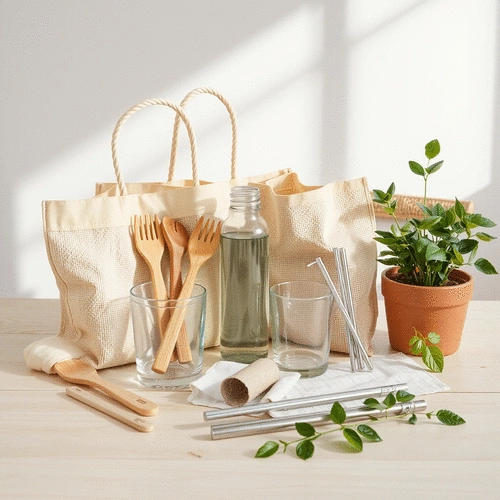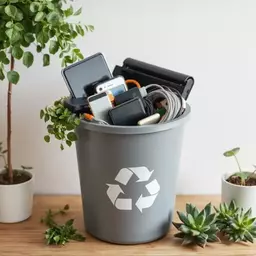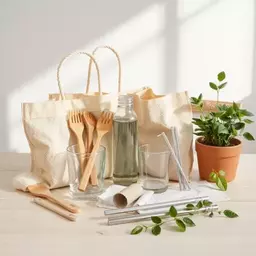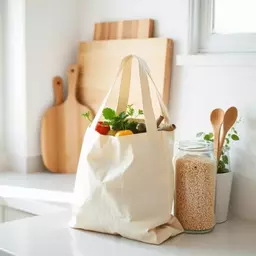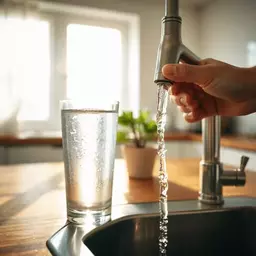As we navigate a world increasingly burdened by waste, the transition to eco-friendly alternatives has never been more critical. With millions of tons of plastic waste polluting our oceans annually, understanding our impact is essential for fostering change. Are you ready to make a difference in your daily life?
Key Takeaways
- Disposable products contribute significantly to environmental degradation, with only 9% of plastic ever being recycled.
- Adopting reusable items, such as bamboo utensils and silicone food covers, can dramatically reduce plastic waste.
- Community involvement and shared experiences can inspire collective action towards sustainable living.
- Gradually replacing disposable items with eco-friendly alternatives requires thoughtful planning and organization.
- Choosing refillable and biodegradable personal care products helps mitigate plastic waste and can promote better health.
Environmental Impact of Disposable Products
Statistics highlighting the urgent need for eco-friendly alternatives to disposable items.
Plastic Production & Recycling
Estimated 300 million tons of plastic are produced globally each year.
Only 9% of all plastic waste has ever been recycled.
Impact on Marine Life
Over 1 million marine creatures die each year due to plastic ingestion.
By 2050, plastic pollution in the ocean is expected to outweigh fish.
Decomposition of Plastic
A single-use plastic bag can take up to 1,000 years to break down.
Call to Action
Switching to reusable items can significantly reduce waste and promote sustainability.
The Growing Need for Eco-Friendly Alternatives to Disposable Items
In today's fast-paced world, we often reach for convenience, especially in our daily use of disposable products. However, as I’ve learned through my own journey in promoting sustainable living at Eco Habits Daily, the impact of these items is significant. From plastic straws to single-use bags, our reliance on disposables contributes heavily to environmental degradation, and it's time we reconsider our choices!
Many people don't realize that every year, millions of tons of plastic waste end up in our oceans and landfills. This not only harms wildlife but also poses long-term threats to ecosystems and human health. By understanding the serious environmental consequences of disposable products, we can inspire change within our communities and make informed decisions about what we consume.
Understanding the Environmental Impact of Disposable Products
Disposable products, like plastic utensils and bags, are convenient but come at a high environmental cost. They contribute to pollution, harm marine life, and take hundreds of years to decompose. It's shocking to realize that an estimated 300 million tons of plastic are produced globally each year, and only a fraction of this is recycled!
To put things into perspective, here are some eye-opening statistics on plastic waste:
- Only 9% of all plastic waste has ever been recycled.
- Over 1 million marine creatures and countless birds die each year due to plastic ingestion.
- Plastic pollution in the ocean is expected to outweigh fish by 2050.
Statistics on Plastic Waste and Its Consequences
The numbers are alarming, but understanding them can be the first step toward change. Each piece of plastic we use contributes to a growing crisis. For instance, a single-use plastic bag can take up to 1,000 years to break down, creating a long-lasting impact on our planet. By recognizing these consequences, we can motivate ourselves and others to seek alternatives.
At Eco Habits Daily, I aim to highlight the importance of these facts through practical solutions that everyone can adopt. It’s about taking small steps to make a big difference!
The Role of Reusable Items in Reducing Environmental Footprint
Switching to reusable items is one of the most effective ways to lessen our environmental footprint. Not only do they reduce waste, but they also promote a more sustainable lifestyle. By making a conscious choice to use reusable products, we can significantly diminish the amount of plastic waste generated.
Here’s a quick list of popular reusable items that can replace disposable products:
- Bamboo utensils instead of plastic forks and spoons.
- Beeswax wraps in place of plastic wrap.
- Silicone food covers instead of traditional food wraps.
- Mesh produce bags to eliminate single-use plastic bags.
Identifying Common Disposable Items and Their Eco-Friendly Counterparts
Recognizing the specific items we often use can help us find suitable eco-friendly alternatives. From dining to grocery shopping, many daily essentials can be replaced with sustainable options. Below, I'll share some of the most common disposable items and their eco-friendly counterparts that align with the mission of Eco Habits Daily.
Adopting these alternatives not only helps the environment but also encourages others in your circle to think more sustainably. Remember, every small change counts!
Pro Tip
Did you know? One of the most effective ways to encourage your community to adopt eco-friendly alternatives is by leading by example. Share your sustainable swaps on social media, host eco-friendly events, and engage with local businesses that prioritize sustainability. Your actions can inspire others to rethink their choices and join the movement toward a greener lifestyle!
Embracing a Sustainable Lifestyle: The Shift from Disposable to Reusable
Transitioning from disposable items to eco-friendly alternatives is not just a personal choice; it's a community movement! At Eco Habits Daily, we believe that sharing our journey can inspire others to make greener choices. When we talk about the changes we've made, we encourage those around us to consider their own habits and how they can contribute to a healthier planet.
One powerful way to promote this shift is by getting involved in local events, workshops, or online forums that focus on sustainability. By actively participating in these communities, we can share tips, experiences, and even challenges we face in adopting a more sustainable lifestyle. Remember, every conversation is an opportunity to spread awareness and spark action!
Encouraging Community Involvement and Awareness
Have you ever felt overwhelmed by the amount of information out there about eco-friendly living? You’re not alone! Sharing personal experiences, like the small changes I made in my own home, can truly resonate with others. Here are some ideas to inspire your community:
- Host a zero-waste potluck where everyone brings dishes made from leftovers.
- Organize a neighborhood clean-up day, focusing on local parks or beaches.
- Create an online group to share sustainable living tips and challenges.
- Invite friends to join you on your next trip to a local farmer’s market.
By fostering a spirit of collaboration, we can create a ripple effect that encourages others to make more sustainable choices. Together, we can build a healthier, cleaner community for everyone!
Sharing Personal Experiences to Inspire Others
Sharing our stories can create a powerful bond within our communities. Have you tried swapping out plastic bags for reusable ones or using a stainless steel water bottle? When you share these experiences, you not only inspire others but also show that living sustainably can be both practical and fun!
One simple way to share is through social media. Post about your latest eco-friendly swap, and encourage your friends to join in. You might be surprised at how others respond positively and start their own sustainable journeys!
Building a Supportive Network for Sustainable Choices
Building a network of like-minded individuals makes the journey toward sustainability so much more enjoyable! There are numerous organizations and initiatives dedicated to promoting eco-friendly living. Connecting with these groups can provide valuable resources and support. Here are a few notable ones:
- Local environmental organizations that host workshops and community events.
- Online platforms and forums focused on sustainable living tips and resources.
- Social media groups dedicated to eco-friendly challenges and swaps.
- Sustainable businesses that host events and offer eco-friendly products.
Finding a supportive community not only enhances motivation but also amplifies our impact. When we share resources and ideas, we empower each other to continue making positive changes in our lives.
Taking Action: Your Role in Reducing Waste Through Thoughtful Choices
So, how can we take action in our daily lives to reduce waste? It all starts with making thoughtful choices! At Eco Habits Daily, I often encourage readers to gradually replace disposable items with reusable ones. This doesn’t have to happen overnight; it’s about creating a plan that fits your lifestyle.
By choosing eco-friendly products, each of us contributes to a larger movement for change. The more we embrace these alternatives, the more we inspire others to do the same. Together, we can create a wave of positive impact that can truly transform our communities!
Practical Steps to Transition to Eco-Friendly Products
Are you ready to start your journey toward a more sustainable lifestyle? Here’s a practical plan to gradually replace disposable items with eco-friendly alternatives:
- Assess what disposable items you frequently use.
- Research eco-friendly alternatives for those items.
- Make a shopping list of reusable products that fit your needs.
- Start with one category at a time, like kitchen items or personal care products.
- Celebrate your progress and share your journey with friends!
By taking these small steps, we can make significant changes in our daily lives that contribute to reducing waste. Remember, every small effort counts!
Creating a Plan for Gradual Replacement of Disposable Items
Creating a plan not only helps you stay organized, but it also makes the transition to eco-friendly living feel manageable. You might find it helpful to keep a journal or a digital log of your progress. Jot down the disposable items you've replaced and the positive changes you've noticed. This can serve as a wonderful reminder of the difference you're making!
Contributing to a Larger Movement for Change
It’s incredible to think that our individual actions can create a collective impact. When we choose reusable products, we’re not just making a personal choice; we’re joining a larger movement towards sustainability. Each time you share your eco-friendly products or practices, you encourage others to think about their own habits.
Connecting with community initiatives focused on sustainability can amplify our efforts. Consider volunteering or supporting local businesses that align with eco-friendly principles. Together, we can champion a greener future!
How Individual Actions Can Lead to Collective Impact
Every action we take contributes to a broader movement for change. For instance, if every person in your community switched to reusable bags, the reduction in plastic waste would be astounding! Let’s remember that the more we share our experiences, the more we inspire others to join us on this journey.
Exploring Reusable Personal Care Products
Have you ever considered how personal care products contribute to waste? From razors to cotton pads, these items can pile up quickly. Switching to refillable and biodegradable personal care items can significantly reduce this waste. Here are some options to explore:
- Reusable makeup remover pads made from organic cotton.
- Biodegradable toothbrushes made from bamboo.
- Refillable deodorant containers to reduce plastic waste.
- Organic menstrual products, like reusable pads or menstrual cups.
By choosing these alternatives, we not only reduce waste but also invest in products that are better for our health and the environment. It’s a win-win situation!
Benefits of Switching to Refillable and Biodegradable Personal Care Items
Switching to refillable and biodegradable personal care items reduces the reliance on single-use plastics, which is crucial for protecting our environment. Not only are these products often more sustainable, but they can also be healthier for our bodies, as they often contain fewer chemicals. By embracing these choices, we enhance our wellbeing while contributing to a cleaner planet!
FAQs: Eco-Friendly Alternatives to Disposable Items
- Q: Why is it important to switch from disposable to eco-friendly products?
- A: Disposable products, particularly plastics, significantly contribute to environmental pollution, harm wildlife, and take hundreds of years to decompose. Switching to eco-friendly alternatives helps reduce waste, conserve resources, and protect ecosystems.
- Q: What are some common eco-friendly alternatives to everyday disposable items?
- A: Common alternatives include bamboo utensils, beeswax wraps, silicone food covers, mesh produce bags, reusable water bottles, and reusable coffee cups. For personal care, consider reusable makeup remover pads, bamboo toothbrushes, and refillable deodorant containers.
- Q: How much plastic waste is produced globally and how much is recycled?
- A: An estimated 300 million tons of plastic are produced globally each year, but only about 9% of all plastic waste has ever been recycled. The vast majority ends up in landfills or pollutes natural environments.
- Q: How can I encourage my community to adopt more sustainable habits?
- A: You can encourage community involvement by sharing your personal experiences with eco-friendly alternatives, organizing local clean-up events, hosting zero-waste gatherings, or creating online groups to share tips and challenges. Leading by example and fostering a supportive network are key.
- Q: What are the benefits of using refillable and biodegradable personal care products?
- A: These products help reduce the reliance on single-use plastics, minimizing waste. They are often healthier for personal use as they contain fewer harsh chemicals, thus benefiting both your well-being and the environment.
Recap of Key Points
Here is a quick recap of the important points discussed in the article:
- Disposable products significantly contribute to environmental degradation, with millions of tons of plastic waste produced annually.
- Switching to reusable items, such as bamboo utensils and silicone covers, can drastically reduce plastic waste.
- Identifying common disposable items and their eco-friendly alternatives empowers individuals to make sustainable choices.
- Community involvement and sharing personal experiences can inspire others to adopt eco-friendly habits.
- Taking practical steps, such as creating a plan to gradually replace disposables, can lead to significant positive change.
- Choosing refillable and biodegradable personal care products not only reduces waste but also benefits personal health.

